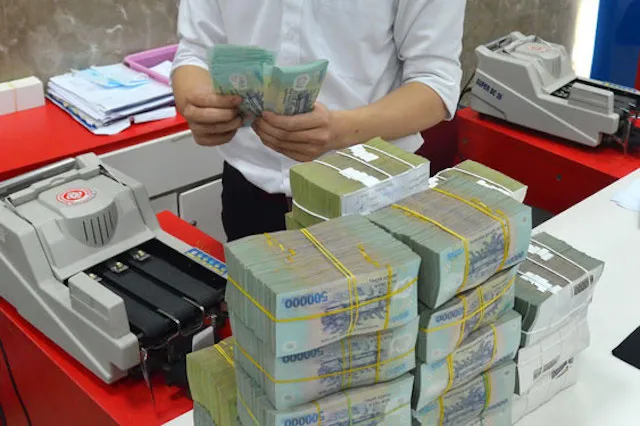
Surge in Outstanding Loans for Real Estate
Data gleaned from the financial statements for the second quarter of 2023 reveals that out of 12 banks disclosing their outstanding real estate business loans, eight reported an increase in lending rates compared to the end of 2022. Techcombank takes the lead with VND 154,000 billion in outstanding loans to real estate businesses as of June 30, 2023. This represents 33.68% of total outstanding loans, reflecting a 7.23% increase compared to year-end 2022. VPBank reported outstanding loans for real estate business at VND 82,764 billion by the end of June 2023, marking a 22% surge from the beginning of the year and constituting approximately 17% of total outstanding loans. SHB recorded VND 59,464 billion in outstanding loans for real estate business, accounting for nearly 15% of total outstanding loans, up from 6.75% at the close of the previous year. MB, on the other hand, reported VND 28,161 billion in outstanding loans for real estate, making up almost 6% of total outstanding loans, compared to 4.64% at the end of the prior year.
Data from the Credit Department for Economic Sectors, which operates under the State Bank of Vietnam (SBV), shows that there has been a notable increase in the amount of credit capital provided to real estate companies. Outstanding real estate business debt for the first half of the year witnessed a growth rate of 17.41%, surpassing the 10.73% growth rate for the entirety of 2022. Strikingly, real estate credit arising from home loan demand, constituting about 65% of the outstanding balance, exhibited a downward trend for the first time in the past three years, with a 1.12% decline by the end of June. This data underscores that credit capital is being channeled toward the supply side of the market.
The sharp increase in outstanding loans for real estate businesses compared to the previous year is largely attributed to limited funding sources for real estate firms following a challenging period for corporate bonds. Between the beginning of the year and July 31, the total value of corporate bonds issued amounted to VND 78,988 billion. Out of this, the real estate group accounted for just VND 26,055 billion. This figure pales in comparison to VND 51,979 billion in 2022 and nearly VND 232,400 billion in 2021. Given these challenges, the credit channel has become the primary means of support for the real estate sector's recovery efforts.
Policy Reversals Loom
As the real estate sector turns to credit for support, Circular 06/2023 by the SBV, effective from September 1, has introduced new regulations to mitigate risks associated with lending activities. This has triggered reactions from the real estate industry, leading to requests for amendments addressed to the Prime Minister and the State Bank. Subsequently, the government, in line with the State Bank of Vietnam's direction, issued Circular 10/2023/TT-NHNN, which suspends the enforcement of Circular 06/2023.
Under the new directive, commercial banks remain authorized to grant loans for capital contribution payments, the purchase and transfer of contributed capital for limited liability companies and partnerships, as well as for contributing capital, purchasing, and receiving the transfer of shares for joint-stock companies that are not listed or traded on UPCoM. Additionally, banks can provide capital to individuals and businesses for capital contributions under capital contribution, investment, or business cooperation contracts aimed at implementing investment projects that are not yet operational. Circular 10/2023 also abandons the regulation against lending for financial compensation, except in cases where two conditions are met: the borrower must have advanced payment capital and have covered project implementation costs.
Many experts have highlighted the risk of policy reversals when the real estate sector becomes overly dependent on credit. Should Circular 06 be reinstated, real estate businesses may encounter further difficulties in accessing capital. While adjustments have been made, Rong Viet Securities Company (VDSC) believes that the revised Circular 06 represents a temporary step aimed at delaying support for the real estate enterprise restructuring process. Thus, real estate companies must prepare for potential policy reversals, as the suspension of these regulations is a temporary reprieve.
Despite adjustments, outstanding loans for real estate businesses surged in the first seven months of the year. Hà Thu Giang, Director of the Credit Department for Economic Sectors at the SBV, pointed out that the increase in outstanding loans for real estate business signifies that measures aimed at alleviating market challenges have begun to yield results. Legal obstacles facing real estate projects are gradually being addressed, enhancing project investors' access to credit. Consequently, banks continue to extend credit to qualified businesses.
Nevertheless, one economic expert has raised concerns about banks providing capital for capital contributions, investments, or business cooperation in projects that lack operational eligibility. If multiple businesses obtain loans to develop projects that are not entirely legal and face potential revocation, the risk could shift to banks. Notably, the corporate bond market poses challenges for real estate companies seeking to issue new bonds while grappling with maturing corporate bonds. As of August 24, 67 businesses listed on HNX, with a total outstanding loan of approximately VND 173,680 billion, primarily belong to the real estate group. For the remainder of 2023, the value of upcoming bonds in the real estate group nears VND 55,734 billion.
Additionally, the bad debt ratio for the real estate sector is rising compared to the same period last year, reaching 2.47% at the end of June 2023, up from 1.53% in 2022. Therefore, regulations governing credit quality control by controlling the purpose of customers' capital utilization, aimed at ensuring the stability of the credit institution system, will need to be implemented to establish safety barriers for the banking industry. Consequently, stakeholders, particularly real estate enterprises, should explore sustainable development solutions for the future to mitigate potential policy shocks.




















